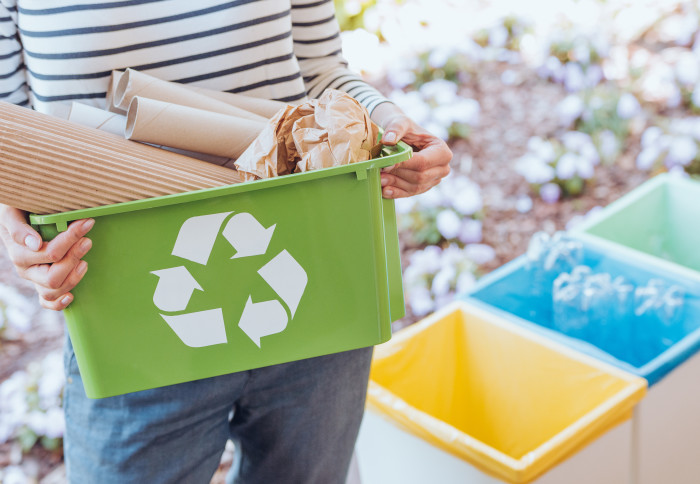Imperial experts join MPs and industry to debate Resources and Waste Strategy
by George Hope, James Rae

Imperial experts joined MPs, industry leaders and other officials to debate the future of the government's Resources and Waste Strategy.
The event, jointly hosted by Imperial's new Transition to Zero Pollution initiative and the cross-party think tank Policy Connect through the All-Party Parliamentary Sustainable Resource Group, analysed the progress of the Resources and Waste Strategy after its publication two years ago.
Imperial academics Professor Nick Voulvoulis and Professor David C Wilson joined senior parliamentarians to share their insights on the strategy, two years on from its publication by the Department for Environment, Food and Rural Affairs.
Chaired by Lord Teverson, Chair of the EU Environment Sub-Committee, opening remarks were delivered by Philip Dunne MP, Chair of the Environmental Audit Committee, and Dr Alan Whitehead MP, Shadow Minister for Energy and the Green New Deal.
Joining the discussions were also industry leaders from REPIC, the Environmental Services Association, the Chartered Institution of Wastes Management, and the Waste and Resources Action Programme (WRAP), who spoke about a range of topics such as extended producer responsibility, waste crime and food waste.
Moving away from the current linear economy
There is a real opportunity to capitalise on the public pressure for action on the climate crisis, to open a dialogue that goes beyond recycling rates, that empowers people to understand and embrace sustainability. Professor Nick Voulvoulis Professor of Environmental Technology
Professor Nick Voulvoulis, from Imperial's Centre for Environmental Policy, presented his findings on the strategy, during which he stated that the measures actually do “little to move us away from the waste-based model of the current linear economy.”
Professor Voulvoulis stated that our current consumption model is deeply ingrained in our behaviours, cultures and institutions, supported by corporate and government practices as opposed to individual choice.
"A circular economy's ultimate goal is to decouple economic growth from resource use, waste and carbon emissions," said Professor Voulvoulis, noting that the strategy only mentions decoupling once.
With more thoughtful decisions about product design, Professor Voulvoulis argued, some 80% of the damage to the environment from waste products could be avoided. Using more resource efficient business models could generate billions in cost savings. However, for these measures to be adopted by business, he believes only a sustained global policy drive by governments will make it happen.
Putting waste management on the COP26 agenda
Professor David C Wilson, from Imperial's Department of Civil and Environmental Engineering, spoke about the government’s commitment to international leadership on resources and waste. He said that the complications from the pandemic and Brexit make it difficult to review the government’s record. However, like Professor Voulvoulis, he believes that there have been significant missed opportunities in building a more sustainable global society.

Professor Wilson argued that there has been significant global partnership on plastics, such as the Commonwealth Clean Ocean Alliance and the £20m of funding for research projects to reduce the impact of plastic waste in developing countries, however there are significant areas of environmental concern which have so far been neglected by the international community.
He referenced a major report by Engineering X, a collaboration between Royal Academy of Engineering and Lloyds Register Foundation, which highlights the widespread issue of open burning of waste in developing countries. Imperial’s own research suggests that the black carbon emissions from this practice constitutes somewhere between 2-10% of total global carbon dioxide equivalent emissions.
Professor Wilson called for the improvement of solid waste management, particularly in developing countries, to be placed firmly on the COP26 agenda, as an achievable short-term climate change mitigation measure.
Reducing consumption and progressing the Environment Bill
The meeting came following the news of the Environment Bill being delayed in the House of Commons. Both Philip Dunne MP and Dr Alan Whitehead MP began proceedings by wishing for the Environmental Bill to be progressed quickly owing to the urgency of the situation and in good time for the COP26 conference later this year, hosted by the UK.
We are not going along the path we should have done in bringing wider resources into the Environment Bill. Dr Alan Whitehead Shadow Minister for Energy and the Green New Deal
In order to meet the challenges of the plastic crisis, Philip Dunne MP, whose Environmental Audit Committee has looked into the waste cycles of plastic bottles, textiles and electronic waste since 2017, called for the government to develop a target of reducing actual consumption to a sustainable level. He urged an end to 'planned obsolescence' of electronics, calling for extending the life of electronics and making repairs more readily available.
For Dr Alan Whitehead MP, the Environment Bill represents a lost opportunity. He stated that key measures like the Deposit Return Schemes and food waste reporting have already seen implementation dates slip from their original deadline.
In regard to the Bill specifically, Dr Whitehead wished its scope to be extended further and include both plastic and non-plastic single use items within the definitions, stating that currently "we have a much narrower definition of the circular economy". He continued "we are not going along the path we should have done in bringing wider resources into the Environment Bill."
The Forum: Connecting our researchers with policymakers
 The Forum is Imperial College London’s policy engagement programme, connecting Imperial researchers with policymakers to discover new thinking on global challenges. Please get in touch if you would like more information.
The Forum is Imperial College London’s policy engagement programme, connecting Imperial researchers with policymakers to discover new thinking on global challenges. Please get in touch if you would like more information.
Imperial College London is grateful for the support of the UKRI Strategic Priorities Fund for carrying out this work.
Article text (excluding photos or graphics) © Imperial College London.
Photos and graphics subject to third party copyright used with permission or © Imperial College London.
Reporter
George Hope
Office of the President
James Rae
Office of the President